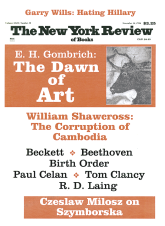Edward Jay Epstein’s Dossier: The Secret History of Armand Hammer especially claims our gratitude because its protagonist would otherwise have been forgotten when he was less than six years dead and his fortune, his monuments, and the whole huge mound of his frauds long since gone up in smoke.
Hammer reached his summit as a swindler when he was running Occidental Petroleum, leeching it for the film company, the museums, the mistresses, and like contributions to the grandiosity of his image, costing it $2.5 billion in losses on visionary projects and leaving its stock shares at a quarter of their worth when his star bedazzled Wall Street.
Few, if not few enough, careers can show success with the ruin of a capital enterprise more remarkable than this one, and the mystery that teases and eludes Epstein is whether Hammer was a Communist agent all the while he was achieving it.
This suspicion explains why Epstein has chosen Dossier as his title. It is a dossier gleaned from lately opened files of the Soviet intelligence services and is as skimpy as Hammer’s ghost would want it to be. Even so, it offers useful glimpses into the apprenticeship in the craft of accumulation that Moscow afforded for lively spirits in the early Twenties.
Young Hammer had come to Moscow in 1921 as the son of a founding member of the American Communist Party who was in prison and was compelled to send him there as his substitute ambassador for trade development. The new Soviet Union held meager attractions for Western cupidity in those days, although Henry Ford was tempted with its prospects as a tractor market.
Meanwhile, Armand Hammer could be of some service as bagman for transmitting funds to American agents of the Communist International, and that function was his initiation into the arts of laundering money he would later employ on the bribes required for Mideastern and South American oil concessions. He also seems to have become so aware of the efficacies of the skim that the general secretary of the American Communist Party was aroused to complain that the Hammers had kept $16,000 for themselves that was to go to the Daily Worker.
Hammer came home broke. But he had already learned, as Epstein shrewdly notes, that we do not sink but only dive and will come up again so long as we keep a friend well wired to government. Anastas Mikoyan was such a friend and already rising toward his crest as deputy Soviet premier and even then in a position to grant Hammer a concession as American distributor of a batch of seized bourgeois jewelry and freshly faked Fabergé baubles for sale as “The Treasury of the Romanoffs” in Midwestern department stores.
The Hammers had recovered; and, though Armand would fall now and then, he would always rise in obedience to the iron law of economic determinism’s guarantee that every capitalist and every politician is available for a price.
Hammer spent at least $10 million greasing strategically placed palms in fourteen countries in Asia, Africa, and Latin America. He won his last rich oil concession in Colombia by bribing the officials he needed and then impartially doled out another $3 million a year to the guerrillas in arms against them for an agreement not to sabotage his pipeline.
In the Fifties, when the vaguest association with the Hollywood Committee for the Arts sufficed to get an actor blacklisted, J. Edgar Hoover took out Armand Hammer’s dossier, reflected on how many senators he had in his pocket, and put it away. Not even the FBI was so powerful as to intrude upon a man who had learned the one great lesson Lenin could teach him, which was not how to overthrow capitalism but how to recognize and take full advantage of the greed that is its motor.
This Issue
November 14, 1996



